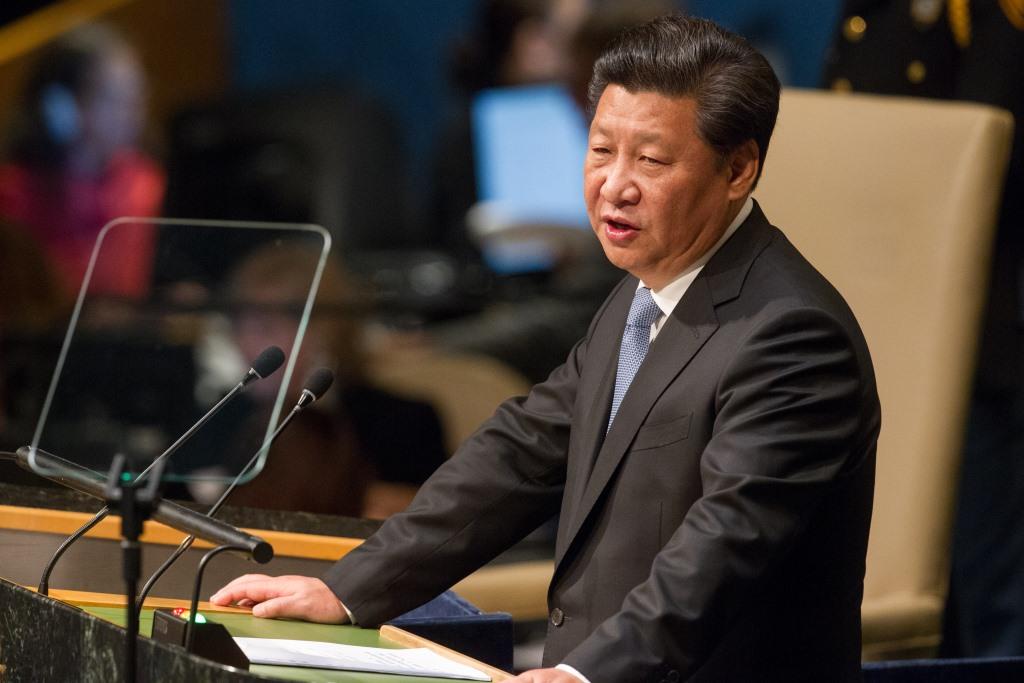Water Wars: Presidents Xi and Obama at the UN
Before concluding his first state visit to the U.S., Xi Jinping traveled several hours north from Washington to tick another item off his list of firsts as PRC Premier: addressing the UN General Assembly. Mr.

Published by The Lawfare Institute
in Cooperation With

Before concluding his first state visit to the U.S., Xi Jinping traveled several hours north from Washington to tick another item off his list of firsts as PRC Premier: addressing the UN General Assembly. Mr. Xi’s remarks did not overtly mention maritime disputes, but some analysts interpreted his assertion that “the sovereignty and territorial integrity of all countries are inviolable, and their internal affairs are not subject to interference” as a reference to the nine-dash line claims in the South and East China Seas, as well as to the mainland itself. As Isaac Stone Fish notes in Foreign Policy, Mr. Xi’s speech also contained several barbs directed at Japan—likely motivated by PM Shinzo Abe’s efforts to circumvent Article 9 of the island nation’s pacifist constitution to allow Japan’s troops to fight overseas. For example, the PRC Premier focused much of his speech on World War II (referred to as the “War of Resistance Against Japanese Aggression” and the “World Anti-Fascist War”). Fish also suggests that Mr. Xi’s pledge that “China will never pursue hegemony, expansion or spheres of influence” was intended as a contrast to Japanese aggression during WWII. In addition to needling Japan, this line was also likely meant to reassure China’s neighbors in the South Pacific.
Not long before Mr. Xi’s remarks, President Obama gave his own address to the General Assembly. Although he focused mostly on broader threats to the international community, the President did briefly comment on the South China Sea:
Similarly, in the South China Sea, the United States makes no claim on territory there. We don’t adjudicate claims. But like every nation gathered here, we have an interest in upholding the basic principles of freedom of navigation and the free flow of commerce, and in resolving disputes through international law, not the law of force. So we will defend these principles, while encouraging China and other claimants to resolve their differences peacefully.
Looking back at President Xi’s time in the United States, the Asian Maritime Transparency Initiative conducted a series of interviews with Bill Bishop and Bonnie Glaser that nicely summarize the highlights of the historic state visit and its consequences moving forward.
In Other News…
United States
Earlier today, Foreign Policy magazine covered breaking news that the U.S. Navy plans to conduct freedom of navigation patrols, with both ships and aircraft operating within twelve nautical miles of at least some of the China’s artificial islands in the South China Sea. Although a final decision is yet to be made, this move would be a significant uptick in American muscle-flexing in the region and would serve as an important, if symbolic, refutation of what U.S. military leaders have called China’s Great Wall of Sand.
On Wednesday, Secretary of State John Kerry and his counterparts from India and Japan held their first-ever trilateral talks and called for freedom of navigation, overflights, and commerce, including in the South China Sea, as the The Hindustan Times recounts.
The Big Four of the House and Senate Armed Services Committees announced on Tuesday the adoption of the Conference Report to the FY 2016 National Defense Authorization Act (NDAA). Section 1263 of the NDAA authorizes the “South China Sea Initiative,” which provides for assistance and training to five nations along the South China Sea—Indonesia, Malaysia, the Philippines, Thailand, and Vietnam—as well as more restrictive payments for training expenses to Brunei, Singapore, and Taiwan.
Reuters reports that the commander of the Japan-based Seventh Fleet, Vice Admiral Scott Swift, has called for the Third Fleet, which is headquartered at San Diego, to expand its engagement in the Western Pacific. As a potential indicator of a shift to come, the commander of the Third Fleet, Vice Admiral Nora Tyson, will represent the United States at the triennial Japan Fleet Review on October 18.
China
USNI’s Sam LaGrone interprets recent photographs published by IHS Jane’s Defence Weekly as “almost without a doubt” proof that China has begun construction on its first domestically-built aircraft carrier, part of what he describes as a PLA plan for a four-carrier navy. Another potential military breakthrough for China—a manned aircraft that hit Mach 5—was reported by Qi Shenjun in China Aviation News and briefly appeared on the state-run news website before the story vanished a few days later, as the The Daily Beast recounts.
Also based on recent satellite photos courtesy of Jane’s Weekly, analysts believe that China has finished its first airstrip in the Spratly Island chain. Located on Fiery Cross Reef, the strip is approximately 3,125 meters in length, and it appears complete based on new runway heading markings and helipad designators.
Japan
Japan’s Ministry of Defense is working to update the rules of engagement for the Japanese Self-Force (JSDF)—a direct result of recent security legislation that, among other things, authorized the right to collective self-defense. The new ROEs will not come into effect next March, but it is already clear that they will be widened significantly. An unnamed source told The Asahi Shimbun that special consideration will be given to a joint action plan with the U.S. for the defense of the Senkaku/Diaoyu Islands.
Masaaki Ishikawa, head of acquisition reform at Japan’s Ministry of Defense, confirmed that Japan would match the offer of European contractors and build a fleet of new submarines entirely in Australia, according to The Maritime Executive. An Aussie advisory panel is expected to make its recommendations on bids from Japan, Germany, and France in November.
Australia
With the ascension of Malcolm Turnbull as prime minister, Australia also has a new defense chief—the country’s tenth since 2006. The new defense minister, Marise Payne, has already voiced her supports for the PM’s recent remarks that China has been “pushing the envelope” in the South China Sea, that Australia will consider a “balancing” strategy against China (although he also offered potential carrots), and that the PRC outranked Middle Eastern terrorism in terms of “the greatest threat to global security.”
Philippines
During the opening ceremonies of the Philippine Amphibious Landing Exercises (Phiblex), a joint training exercise involving about 800 U.S. Marines and 700 Philippine troops, BG Paul Kennedy (USMC) called the United States the “best friends” the PH has in the region and vowed that the U.S. would respond “within hours” if its ally’s sovereignty were ever challenged.
Reuters reports that the PH military’s plans to renovate an airbase at the former U.S. naval facility in Subic Bay may face delays caused by a spending ban that will begin next March in advance of general elections in May. When repairs are complete, new fighter jets and two frigates will operate out of the installation, which has been shuttered since the end of the Cold War.
Vietnam
During an interview with the Associated Press at the United Nations, Vietnamese President Truong Tan Sang countered President Xi Jinping’s claim that the Paracel and Spratly Islands have belonged to China since ancient times. Mr. Sang claimed that his nation has “all historical and legal evidence to support our sovereignty.” He also told the AP that the PRC’s island reclamation project violates international law and endangers maritime security, and he called on the United States to lift its ban on lethal weapons sales to Vietnam.
Taiwan
Taiwan News reports that the Taiwanese Coast Guard chased off nearly one hundred Chinese fishing boats that were attempting to poach fish near Kinmen Island on Monday. Prior to the incident, 54 Chinese vessels had been dispersed and 31 detained near Kinmen this year.
Malaysia
Local Malay fishermen have expressed deep misgivings about the presence of a Chinese Coast Guard vessel anchored near Luconia Shoals, according to the Borneo Times.
Analysis, Commentary, and Additional Information
Over at The Diplomat, LCDR Steven Stashwick (USNR) warns against resurrecting the Cold-War-era obsession with miscalculation in the context of the South China Sea—a timely reminder given the additions to the MOU on Confidence Building Measures announced last week. LCDR Stashwick argues that an undue focus on miscalculation “conflates the symptoms of the disputes (incidents at sea) with the terms of the dispute itself (maritime rights and sovereignty)” and that resolving ambiguity reduces flexibility and, thereby, increases the likelihood of open conflict.
The National Interest’s Allen Carlson opines that, although Chinese nationalism drives the potential for conflict in both the East and South China Seas, the PRC’s deep animosity toward Japan paradoxically acts as a deterrent. Elsewhere at the magazine, Lyle Goldstein lambasts the DC policy community for propagating five dangerous myths on the South China Sea, while Peter Mattis argues that the U.S. must adopt a more aggressive approach of deterrence by denial.
Taking a similar tact, James Stavridis’s article in Foreign Policy maps out of a four-point plan for countering China’s “Great Wall of Sand” and insists that the Xi-Obama summit changes nothing.
The Center for Strategic and International Studies will host Antonio Carpio, Senior Associate Justice of the Philippine Supreme Court, for a lecture on why China’s nine-dash line claim is the root cause of the disputes in the South China Sea on Monday, October 5, at 2:00pm.
Water Wars is our weekly roundup of the latest news, analysis, and opinions related to ongoing tensions in the South and East China Seas. Please feel free to email Zack Bluestone with breaking news or relevant documents.




